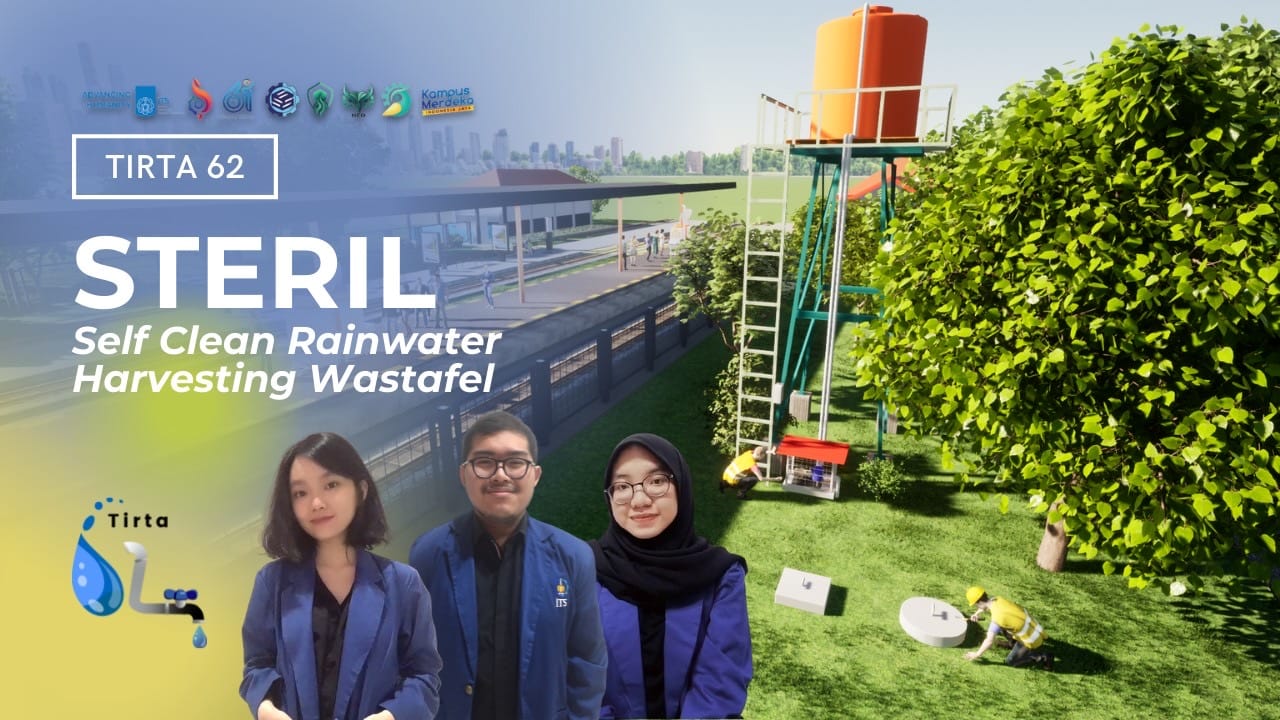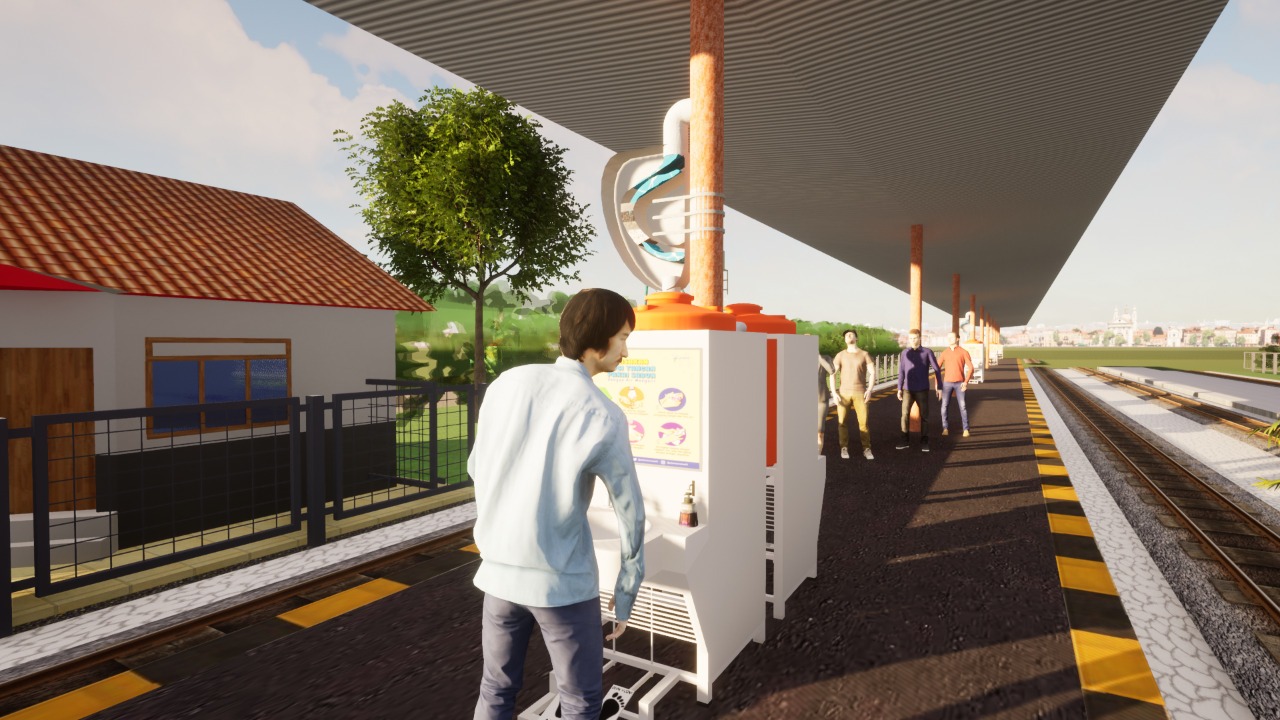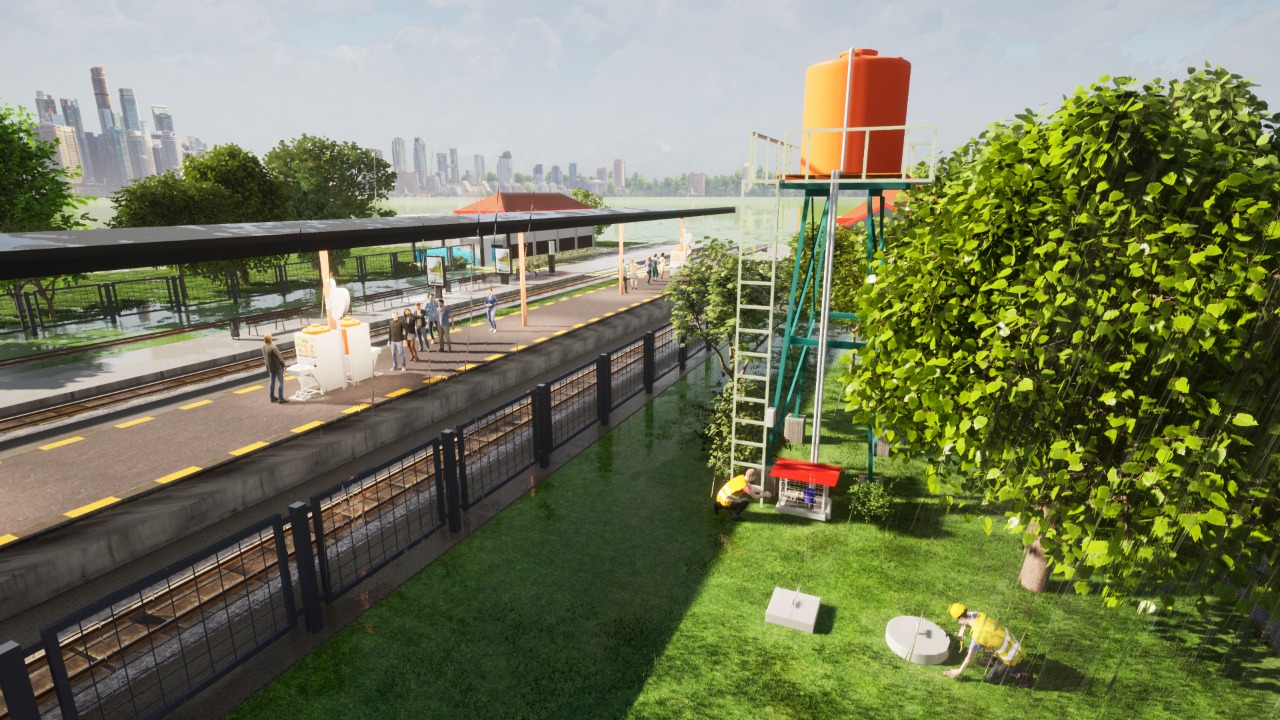Facing a Water Deficit, ITS Innovates Rainwater Sterilization

(from left) Bernadeta Elie, Rayhan Airlangga Wijanarko Putra, and Dina Permatasari Putri from the ITS TIRTA 62 team while participating in a competition with rainwater sterilization innovation
ITS Campus, ITS News – Washing hands with clean water, especially in public facilities, is one of the steps to break the chain of spreading the Covid-19 virus. However, this can be hampered with due to the shortage of clean water in the surrounding area. To overcome this problem, the TIRTA 62 team consisting of three students from Institut Teknologi Sepuluh Nopember (ITS) innovated the Self Clean Rainwater Harvesting Sink (Steril), a sink that can process rainwater into clean water for washing hands.
One of the public facilities that are the source of the spread of the Covid-19 virus in Indonesia is the train station. Based on data from PT Kereta Api Indonesia (KAI) in 2020, one of the stations with the highest number of visitors is Kemayoran Station, Jakarta with the number of visitors reaching 1.6 million people per day. “Clean sanitation at stations supports the implementation of health protocols in public places,” said Bernadeta Elie, Team Leader of TIRTA 62.
However, the results of an analysis by the DKI Jakarta Drinking Water Service Regulatory Agency (BRPAM) in 2006 stated that Jakarta will continue to experience a clean water deficit. On the other hand, the Kemayoran Meteorological Station stated that the amount of rainfall in Jakarta in 2020 had increased by 80 percent from the previous year. “Sterile can be a solution to the crisis in the availability of clean water and sanitation quality by maximizing the potential of rainwater,” added this student from the ITS Civil Engineering Department.

Sterile sink design, designed by the TIRTA 62 team from ITS students, aimed at Kemayoran Station, Jakarta
Going deeper, the girl who is familiarly called Brenda explained that in the sterile system, rainwater first goes through a collection process on the roof of the platform and then flows to the filter section to be given water quality treatment. The filtration components consist of a microfiber filter, silver ion, activated carbon, Polyethylene Terephthalate (PET) membrane, and limestone. “These eight filtration units will process rainwater into clean water,” she said.
Rainwater that has been processed into clean water will be channeled to lower reservoirs and absorption wells. From the reservoir below, the water is then channeled to the upper reservoir with a volume of 8 cubic meters using a water pump for four hours. “The upper reservoir serves as a temporary storage area, before being channeled into a small reservoir on the sink which is located on the platform gravitationally,” she explained.

The appearance of the sterile filtration design, the design of the ITS student team, as a whole
Brenda added, the capacity of small reservoirs in the sterile sinks is 300 liters each and can meet the need for clean water for washing hands up to 28 percent for 450,000 passengers at Kemayoran Station. “Excess rainwater from the processing will be forwarded to absorption wells,” said the 2019 student.
The innovation team consisting of two other students from the ITS 2019 Civil Engineering Department, namely Dina Permatasari Putri and Rayhan Airlangga Wijanarko Putra, has succeeded in winning the first place title in the Civil Innovation Paper Competition (Cinnertion) D’Village 10th Edition competition. In addition, the team, which was guided by the ITS Civil Engineering Department lecturer, Novi Andriany Teguh ST, MSc, also managed to get an award as Best Paper.

The roof of the platform where rainwater collects will be converted into clean water for washing hands
Not only innovating in the competition-themed Conservation of Water Resources to Ensure Availability of Clean Water and Sanitation as Efforts to Realize SDGs 2030. The TIRTA 62 team also hopes that Steril will be developed and researched further so that sterilization efficiency can be increased to 100 percent. “Steril is expected to be able to ensure the availability and sustainable management of clean water and sanitation for the community,” she concluded. (ITS Public Relation/far)
Reporter: Frecia Elrivia Mardianto
Related News
-
ITS Wins 2024 Project Implementation Award for Commitment to Gender Implementation
ITS Campus, ITS News —Not only technology-oriented, Institut Teknologi Sepuluh Nopember (ITS) also show its commitment to support gender
March 30, 2022 17:03 -
ITS Professor Researched the Role of Human Integration in Sustainable Architecture
ITS Campus, ITS News –The developing era has an impact on many aspects of life, including in the field
March 30, 2022 17:03 -
ITS Sends Off Group for Joint Homecoming to 64 Destination Areas
ITS Campus, ITS News — Approaching Eid al-Fitr, the Sepuluh Nopember Institute of Technology (ITS) is once again facilitating academics who want
March 30, 2022 17:03 -
ITS Expert: IHSG Decline Has Significant Impact on Indonesian Economy
ITS Campus, ITS News — The decline in the Composite Stock Price Index (IHSG) by five percent on March 18,
March 30, 2022 17:03
